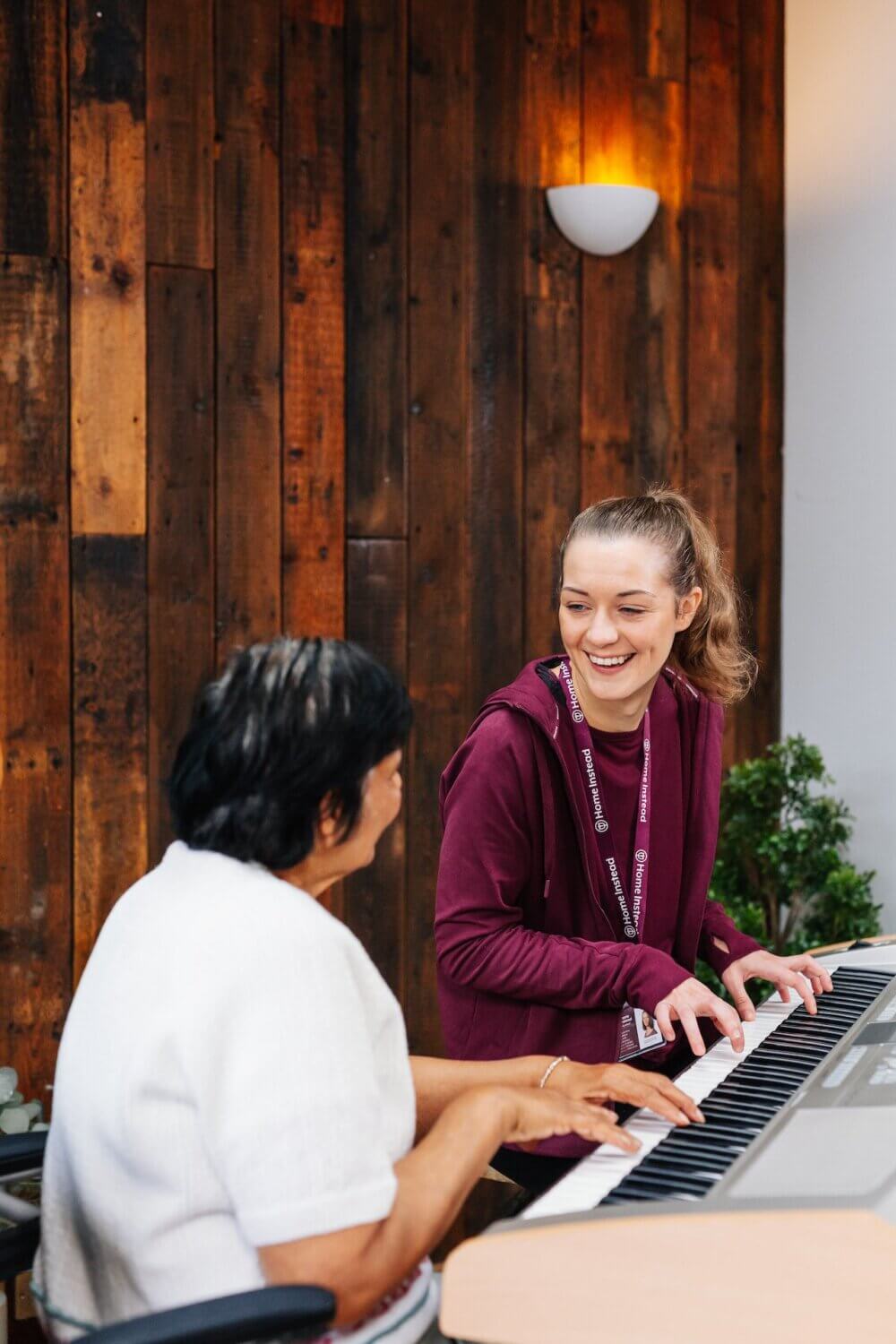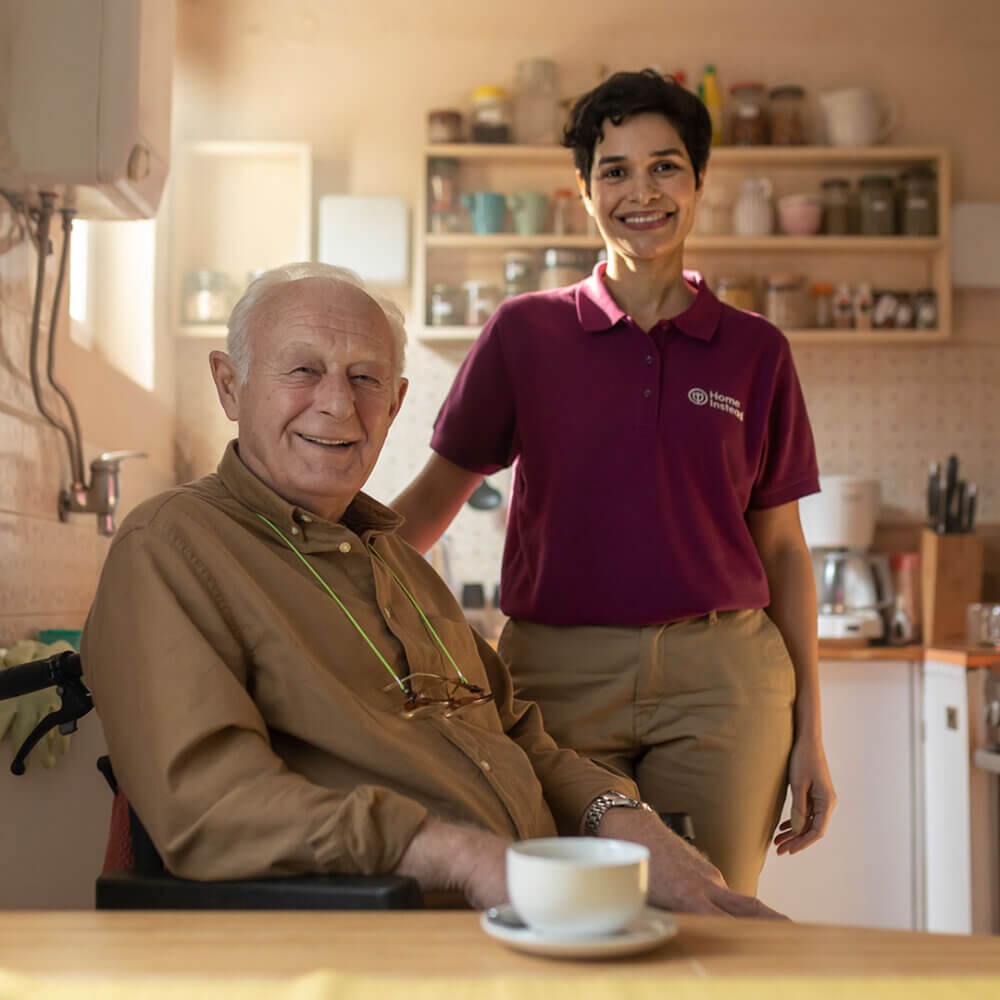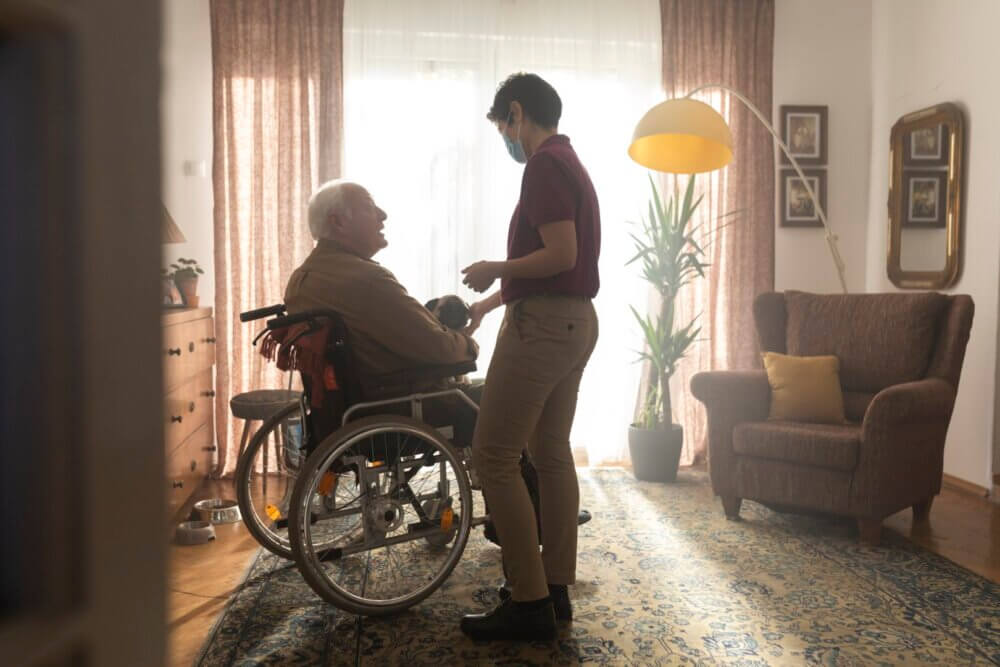How to be an Active and Empathetic Listener for Ageing Parents
In both professional and personal settings, possessing strong listening skills is essential.

In both professional and personal settings, possessing strong listening skills is essential. Effective communication hinges not only on what we say but also on how we listen. At Home Instead Home Care Bedford – Visiting & Live-in Care, we understand the profound impact of active and empathetic listening on the quality of care we provide. This blog post explores how to be an active and empathetic listener, offering insights and techniques to enhance your conversation skills in Bedford.

Understanding Active and Empathetic Listening
Active listening involves fully concentrating, understanding, responding, and remembering what the speaker is saying. It is a critical skill in both professional and personal settings, facilitating meaningful conversations and building stronger relationships. Empathic listening goes a step further, involving not just hearing the words but also understanding the speaker’s emotions and perspective.
The Benefits of Active and Empathetic Listening
- Improved Relationships: Whether with friends, family, or coworkers, being a good conversationalist fosters stronger, more trusting relationships.
- Enhanced Communication: Clear and effective communication helps avoid misunderstandings and resolves conflicts.
- Increased Understanding: By practising active listening, you gain a deeper understanding of others’ points of view and emotions.
- Better Support: As an empathetic listener, you create a safe space for others to express themselves, leading to more supportive interactions.

Techniques for Active Listening
Maintain Eye Contact
Maintaining eye contact shows the speaker that you are fully engaged and interested in what they are saying. This non-verbal cue is a powerful sign of attention and respect.
Use Open Body Language
Open body language, such as nodding, leaning slightly forward, and uncrossing your arms, signals that you are receptive and attentive. Avoiding closed-off postures can make the speaker feel more comfortable and willing to share.
Avoid Interrupting
Interrupting can disrupt the speaker’s train of thought and may make them feel undervalued. Allow the person to complete their thoughts before responding. This shows respect and allows for a more natural flow of conversation.
Reflect and Clarify
Reflecting back what the speaker has said and asking clarifying questions demonstrates that you are actively listening and engaged. Phrases like “What I’m hearing you say is…” or “Can you explain more about…?” can help ensure you understand correctly.
Stay Present
Focusing on the present moment is crucial for active listening. Avoid letting your mind wander or thinking about your response while the other person is speaking. Being fully present allows you to catch nuances and better understand the speaker’s message.

Empathic Listening Skills
Recognise and Validate Emotions
Empathic listening involves recognising the speaker’s emotions and validating them. Phrases like “I can see that you’re feeling…” or “It sounds like this is really important to you” can make the speaker feel heard and understood.
Use Empathic Listening Techniques
Techniques such as paraphrasing, summarising, and reflecting feelings can help you connect with the speaker on a deeper level. This not only improves the quality of the conversation but also builds trust and empathy.
Avoid Judgement
Listening without judgement is key to empathic listening. By remaining neutral and open-minded, you create a safe space for the speaker to express themselves freely.
Show Genuine Interest
Being curious and genuinely interested in the speaker’s story encourages them to share more. Asking open-ended questions can help explore their thoughts and feelings further.
Respond Appropriately
Responding with empathy involves acknowledging the speaker’s emotions and providing support or solutions as needed. Sometimes, just listening is enough; at other times, offering advice or assistance can be helpful.

Practical Applications in Daily Life
In Professional Settings
In professional settings, such as during a job interview, active and empathic listening can help build rapport and make the interviewee feel comfortable. Understanding the interviewee’s experiences and perspectives can lead to a more insightful and productive conversation.
In Personal Settings
In personal settings, these skills are equally important. Engaging in good conversation with friends and family strengthens your relationships and ensures that everyone feels valued and understood.
Handling Controversial Topics
When discussing controversial topics like politics or religion, maintaining a calm and open demeanour is crucial. Listening without judgement and seeking common ground can help navigate these conversations smoothly.

Examples of Active and Empathic Listening
Example 1: Listening to a Friend
Imagine a friend is sharing a difficult experience. As an active and empathic listener, you would maintain eye contact, nod to show understanding, and refrain from interrupting. You might say, “It sounds like that was really challenging for you. How are you feeling now?”
Example 2: Professional Setting
In a work meeting, when a coworker is presenting their ideas, you could show active listening by nodding, maintaining eye contact, and asking clarifying questions like, “Can you elaborate on how this strategy would work in practice?”

Developing Listening Skills
Practice Regularly
Like any skill, listening improves with practice. Engage in conversations with the intent to listen actively and empathetically. Over time, these skills will become second nature.
Seek Feedback
Ask friends, family, or colleagues for feedback on your listening skills. Understanding how others perceive your listening can provide valuable insights for improvement.
Reflect on Conversations
After conversations, take a moment to reflect on your listening. Consider what went well and what could be improved. This self-awareness can help you become a better listener.
Stay Curious
Maintaining a sense of curiosity about others’ lives and experiences enhances your ability to listen empathetically. Being genuinely interested in what others have to say makes for more engaging and meaningful conversations.

Local Resource: Therapycounselling.org
When it comes to enhancing listening skills or addressing personal challenges, seeking professional support can be incredibly beneficial. Therapycounselling.org offers a network of experienced therapists and counsellors in Bedfordshire who can help with issues such as anxiety, burnout, depression, grief, relationship problems, stress, and trauma. With options for both face-to-face and online sessions, you can find flexible, accessible support that fits your schedule and comfort level.
The therapists and counsellors at Therapycounselling.org are committed to providing a safe, non-judgemental space where you can explore your thoughts and emotions. Whether you need help managing stress, improving your relationships, or overcoming personal challenges, their expertise ensures you receive tailored support. To find the right therapist or counsellor for your needs, visit their platform to view detailed profiles and contact

Conclusion
Mastering the art of active and empathetic listening can significantly enhance your communication skills, leading to stronger relationships and more effective interactions in both professional and personal settings. At Home Instead Home Care Bedford – Visiting & Live-in Care, we prioritise these skills in our caregiving approach, ensuring that we provide compassionate and attentive care to our clients.
By integrating these listening techniques into your daily life, you can create more meaningful connections and better understand the people around you. Whether you are supporting a loved one, engaging with coworkers, or simply having a good conversation, the power of listening cannot be overstated.
For more information on how Home Instead Bedford can support you or your loved ones with professional and compassionate care, please visit our website or contact us directly. We are here to listen, understand, and provide the highest quality of home care services.

Areas We Serve
Bedford, Biddenham, Great Denham, Queen’s Park, Brickhill, Clapham, Renhold, Kempston, Wixams , Cranfield, Marston Moretaine, Wootton, Bolnhurst, Colmworth, Keysoe, Melchbourne, Thurleigh, Ampthill, Clophill, Flitwick, Silsoe, Shefford, Campton, Chicksands, Meppershall
MK40 1, MK40 2, MK40 3, MK40 4, MK41 0, MK41 6, MK41 7, MK41 8, MK41 9, MK42 0, MK42 6, MK42 7, MK42 8, MK42 9, MK43 0, MK43 8, MK43 9, MK44 2, MK44 3, MK45 2, MK45 3, SG17 5
106A Bedford Rd, Wootton, Bedford MK43 9JB, UK
01234 677693